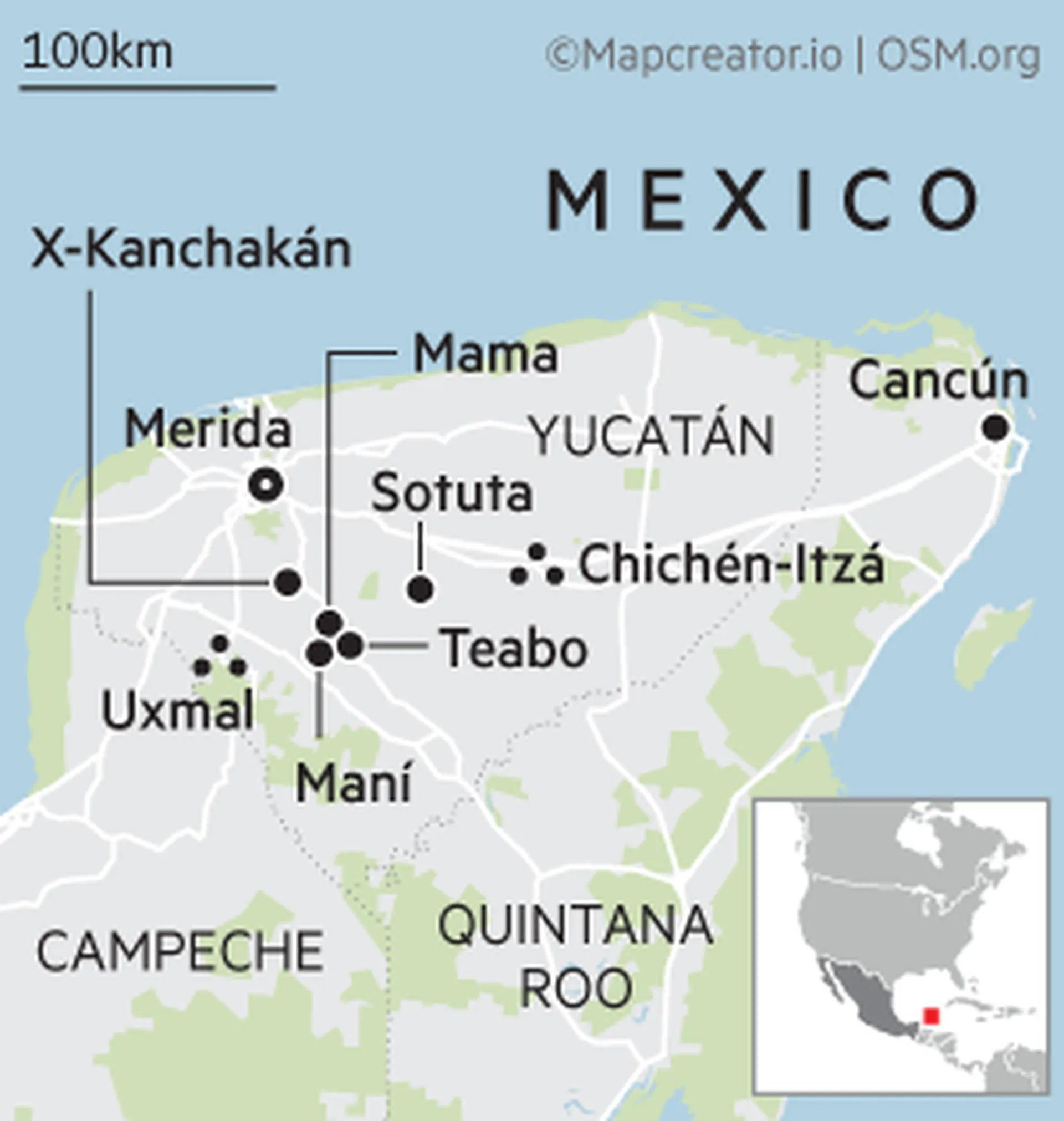It is difficult to know what the Mayans did for a good time. Their chief sport — known to us simply as the ball game — was a kind of cross between football, basketball and hara-kiri. Rules stipulated you weren’t allowed to use either your hands or your feet but instead manoeuvred the ball — it weighed up to 8lbs, and was not allowed to touch the ground — with your shoulders, your hips, your buttocks or your back to get it through one of the two hoops on the side walls. Defeat didn’t mean dropping three points. The losing team were lined up and sometimes — the ultimate hairdryer treatment — decapitated.
很难知道玛雅人是如何消遣的。他们的主要运动——我们简单地称之为球赛——是一种介于足球、篮球和切腹之间的混合运动。规则规定不能用手或脚,而是用肩膀、臀部、臀部或背部操控球——球重达8磅,且不能触地——将球送入侧墙上的两个篮圈之一。失败并不只是失去三分。输球的队伍会被排成一排,有时甚至会被斩首,这就是终极的惩罚。
The Yucatán peninsula lay at the heart of the Mayan world, an entity that spilled across present-day national boundaries into Guatemala, Belize and Honduras. Its sun-baked landscapes are dotted with the ruins of an empire whose sudden demise sometime in the ninth century, known as the Mayan collapse, still mystifies historians and archaeologists.
尤卡坦半岛位于玛雅世界的中心,这个实体跨越了现今的国界,延伸至危地马拉、伯利兹和洪都拉斯。它那被太阳炙烤的风景中点缀着一个帝国的废墟,这个帝国在公元九世纪某个时候突然灭亡,被称为玛雅崩溃,至今仍让历史学家和考古学家感到困惑。
The Yucatán sticks out into the Gulf of Mexico like a sore thumb. Historically, it has always been somewhat separate from the rest of Mexico, more linked by sea to Europe than by bad roads to Mexico City. Today it is famous for the resort hotels of Cancún that litter 80 miles of its eastern coast. But Cancún has no connection to the rest of the peninsula. In Mayan, Cancún means “nest of snakes”. I was heading for the interior.
尤卡坦州像一只显眼的拇指一样伸入墨西哥湾。从历史上看,它一直与墨西哥其他地区有所分离,更多地通过海洋与欧洲联系,而不是通过糟糕的道路与墨西哥城(Mexico City)相连。如今,它以坎昆的度假酒店而闻名,这些酒店分布在其东海岸80英里处。但坎昆与半岛其他地区没有联系。在玛雅中,坎昆意为“蛇巢”。我正前往内陆。
Beneath vast skies, the Yucatán peninsula is bleakly beautiful, an atmospheric flatland covered in low jungle and dry scrub where parched fields are tended by men with hoes. Among Mexicans, Yucatecans have a reputation for civility, for honesty, for shyness. Down empty country roads are sweet old-fashioned villages where dogs meander, children scrump for sugar apples and old people sit on stoops, while horses pant beneath heavy ceiba trees. There is a sense of nostalgia here, as if the Yucatán belongs to an earlier, simpler, more honourable age.
在广阔的天空下,尤卡坦半岛凄美而美丽,是一片覆盖着低矮丛林和干燥灌木的平原,干旱的田地由手持锄头的人们耕种。在墨西哥人中,尤卡坦人以文明、诚实和腼腆著称。沿着空旷的乡间小路,是温馨的老式村庄,狗悠闲地漫步,孩子们摘采糖苹果,老人坐在门廊上,马在厚重的木棉树下喘息。这里有一种怀旧的感觉,仿佛尤卡坦州属于一个更早、更简单、更光荣的时代。

As for Mérida, Yucatán’s chief city, it has became Mexico’s safety valve. Weary of the crime and chaos elsewhere, this is where wealthy Mexicans all want to relocate. The city is an elegant place of squares and courtyards, of Belle Époque mansions and humble one-storey houses in pastel colours. Looming over the Plaza Grande is the Catedral de San Ildefonso, the oldest cathedral on the American mainland, completed in 1598, 28 years before the Dutch got around to building the first rickety trading shack on Manhattan.
至于尤卡坦州的首府梅里达,它已成为墨西哥的安全阀。厌倦了其他地方的犯罪和混乱,富裕的墨西哥人都想搬到这里来。这个城市优雅而美丽,拥有广场和庭院,有美好时代的豪宅和柔和色彩的简朴单层房屋。大广场上矗立着圣伊尔德丰索大教堂,这是美洲大陆上最古老的大教堂,建于1598年,比荷兰在曼哈顿建造第一座简陋的贸易小屋早了28年。